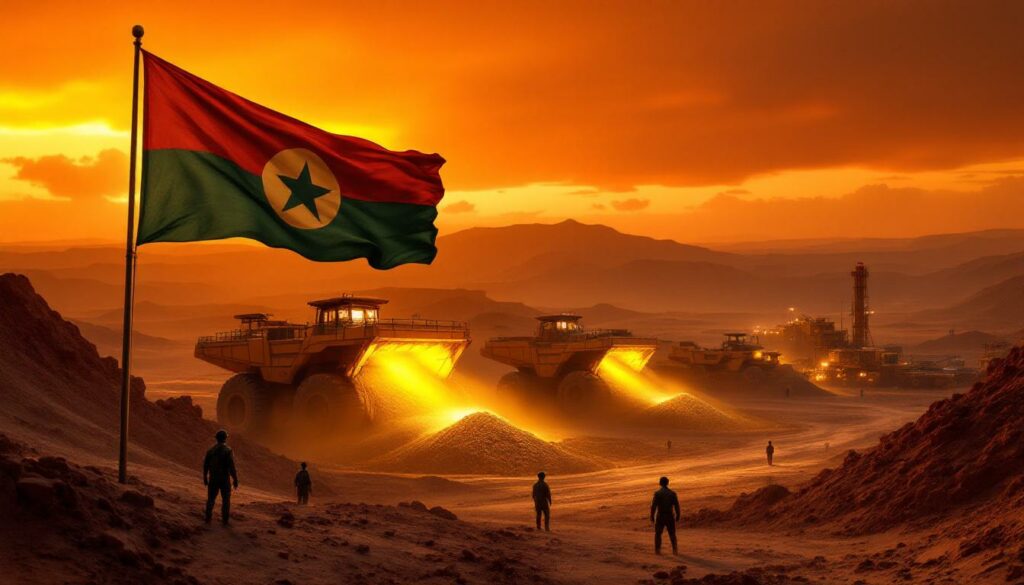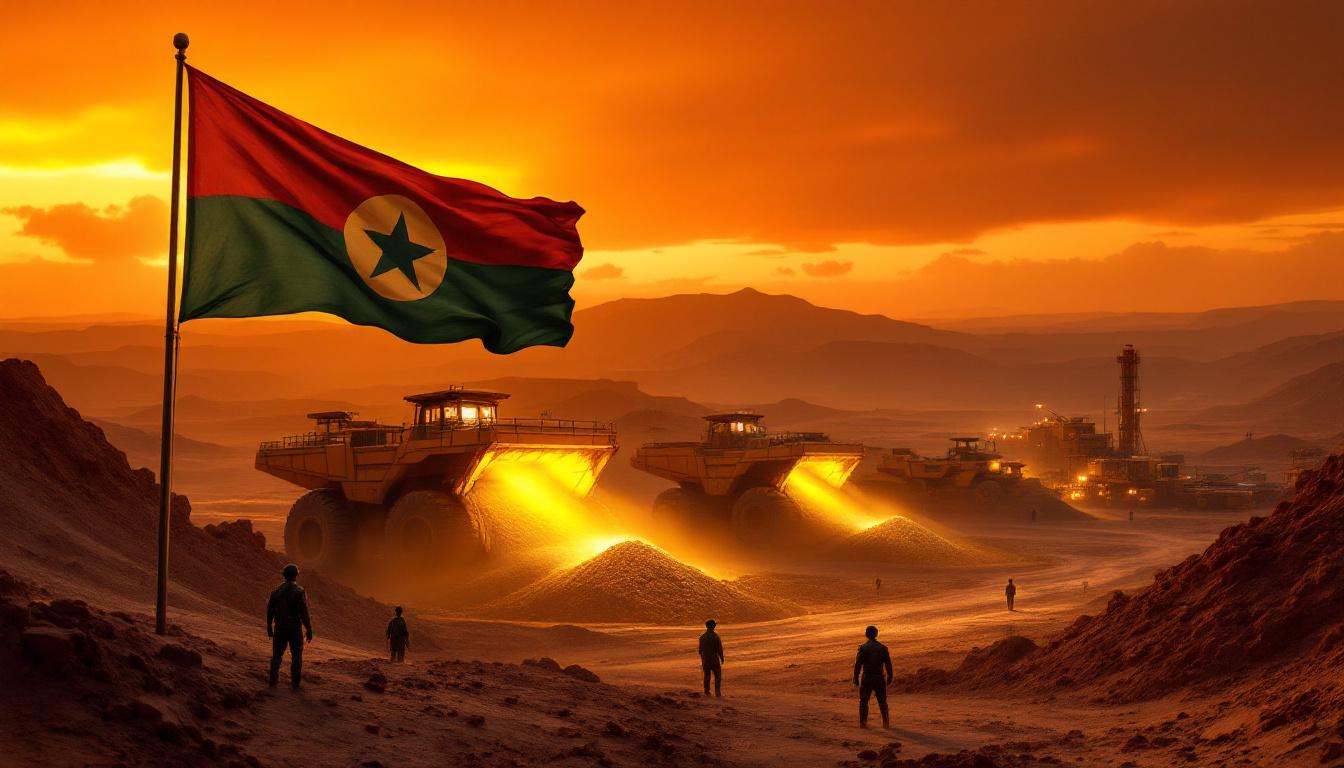Niger Junta's Seizure of Orano's Uranium Mine: Geopolitical Implications and Resource Nationalism
In a bold move that sent shockwaves through the global mining industry, Niger's military government seized control of Orano's uranium operations, marking a significant escalation in resource nationalism across West Africa. This development represents not just a commercial dispute but a fundamental shift in how resource-rich African nations are approaching control of their natural wealth.
What Led to Niger's Takeover of Orano's Uranium Mine?
The dramatic seizure didn't happen overnight but resulted from a steadily deteriorating relationship between Niger's military junta and the French nuclear giant Orano. The standoff began intensifying shortly after the July 2023 coup that ousted President Mohamed Bazoum, with tensions mounting as the new military government reassessed foreign partnerships.
By December 2023, the junta had already begun asserting operational control over Orano's mining operations. However, the situation reached a critical point in April 2024 when Niger's military government officially announced the complete takeover of the Somaïr uranium mine, citing serious contractual violations and accusing Orano of extracting uranium beyond permitted limits.
"Niger has decided to take total control of the Somaïr company to allow for healthier and more sustainable management of its resources," the junta declared in an official statement that signaled a dramatic shift in the country's resource management philosophy.
The military government's accusations were specific and damning. They claimed Orano had violated shareholder agreements, exploited uranium resources beyond authorized levels, and operated with insufficient transparency. These allegations served as the legal foundation for what many observers describe as nationalization in all but name.
Orano's response was swift but ultimately ineffective. The company halted operations and repatriated French staff, while simultaneously launching arbitration proceedings through international channels. This corporate retreat, however, only created the vacuum that Niger's military leaders were eager to fill.
How Does This Fit into Broader Regional Trends?
Niger's actions don't exist in isolation but represent part of a sweeping change across the Sahel region. Over the past five years, military coups have reshaped the political landscape in Mali, Burkina Faso, Chad, and Niger. This political transformation has been accompanied by a consistent pattern of ejecting Western military forces and economic interests.
The pivot away from traditional Western partnerships has been remarkably coordinated. Mali expelled French troops in 2022, followed by similar moves in Burkina Faso. Niger completed this trifecta by ordering the withdrawal of American forces in March 2024, effectively ending decades of Western security cooperation in the region.
As Western influence wanes, new partnerships are emerging. Russia's Wagner Group has established security relationships across the Sahel, while economic ties with both Russia and Turkey have strengthened considerably. These new alliances offer military governments alternatives to Western partnerships that typically came with governance and human rights conditions.
Resource Nationalism Across West Africa
The uranium mine halt in Namibia follows a pattern of resource nationalism that has already transformed the mining sector in neighboring Mali. There, Barrick Gold has struggled to maintain control of the Loulo-Gounkoto gold complex amid mounting government pressure. The detention of Resolute Mining's executives resulted in a $160 million settlement, demonstrating the leverage that host governments increasingly wield.
Mali's government claims these aggressive tactics have generated over 700 billion CFA francs ($1.2 billion) in additional mining revenue – a powerful incentive for other resource-rich nations to follow suit. With gold accounting for approximately 25% of Mali's budget and minerals comprising 14% of Burkina Faso's national income, the economic stakes of resource control are enormous.
What Are the Economic Implications of the Mine Seizure?
Niger possesses approximately 6% of the world's uranium resources, positioning it among the top 10 global sources of this critical element. While this percentage might seem modest, uranium's importance to nuclear energy makes even relatively small market disruptions significant for global supply chains.
The Somaïr mine specifically represents about 5% of global uranium production, making its operational future a matter of international concern. Any significant production changes could create ripple effects through uranium market volatility already experiencing disruption due to renewed interest in nuclear energy.
For Niger itself, uranium exports have historically accounted for approximately 40% of export earnings, highlighting the economic significance of this resource. The military government's gamble rests on the assumption that they can maintain or increase production levels while capturing a greater share of the revenue.
Investment Climate Consequences
Mining industry analysts warn that the seizure will likely have chilling effects on Western investment throughout the region. Companies typically assess political risk when making multi-billion dollar mining investments, and the pattern of resource nationalism across the Sahel significantly elevates that risk profile.
"When companies see host governments changing the rules mid-game, they naturally redirect investments toward jurisdictions with more predictable regulatory environments," explains mining industry consultant Robert Pascal. "Countries like Botswana, Ghana, and Namibia may benefit from investment that might otherwise have gone to the Sahel."
The longer-term economic consequences for Niger could be severe. While the immediate effect may be increased government revenue, the lack of technical expertise and reduced access to international capital markets could hamper the development of new mining projects. Without continuous investment in exploration and development, production typically declines over time.
What Legal Battles Are Unfolding?
Orano hasn't surrendered its assets without a fight. The company has initiated multiple arbitration cases against Niger's government, including proceedings under the investment protection provisions of bilateral treaties between France and Niger.
The legal battleground expanded further when Nigerien security forces raided Orano's offices in Niamey, prompting additional legal complaints. These complex proceedings will likely continue for years, creating uncertainty for both parties and potentially for uranium markets.
International law experts suggest that while host countries have sovereignty over their natural resources, international investment treaties provide important protections against expropriation without fair compensation. The outcome of these cases could establish important precedents for resource nationalism throughout Africa.
Historical Precedents and Potential Outcomes
Resource nationalization has a long and complex history globally. Countries like Chile, Bolivia, and Indonesia have all pursued various forms of resource nationalism with mixed results. The most successful cases typically involve a gradual increase in local ownership and benefits rather than abrupt seizures.
Legal experts point to Libya's nationalization of oil assets in the 1970s and Venezuela's more recent resource seizures as cautionary tales. Both resulted in protracted legal battles and, ultimately, decreased production as technical expertise and investment capital diminished.
The international arbitration system, while sometimes criticized for favoring corporate interests, has generally required fair compensation for nationalized assets. Niger may ultimately face significant financial penalties that could offset any short-term gains from the seizure.
How Might This Affect Global Uranium Markets?
The immediate market response to Niger's takeover has been surprisingly muted, with uranium prices showing only modest volatility. This stability likely reflects several factors: the relatively small percentage of global production affected, existing inventory buffers, and the market's uncertainty about whether production will actually decrease.
If production at Somaïr diminishes significantly, however, the impacts could become more pronounced. Uranium supply chains are relatively inelastic in the short term, meaning that even modest supply disruptions can trigger disproportionate price movements.
The global nuclear industry requires approximately 62,000 tons of uranium annually. With Somaïr producing around 2,000 tons in recent years, any substantial disruption would need to be offset by increased production elsewhere or by drawing down strategic reserves.
Nuclear Energy Industry Implications
For the nuclear power industry, supply certainty is paramount. Reactors typically plan fuel supplies years in advance, making unexpected disruptions particularly problematic. Countries heavily dependent on nuclear power, including France (which derives about 70% of its electricity from nuclear), may need to diversify their uranium sourcing.
The seizure comes at a particularly sensitive time for nuclear energy. Growing concerns about climate change have prompted renewed interest in nuclear power as a low-carbon energy source. Any significant supply disruptions or price volatility could complicate this nuclear renaissance.
Nuclear utility companies may respond by increasing inventory levels, diversifying supplier relationships, and potentially accelerating research into alternative fuel cycles that require less natural uranium. Some may also pursue long-term supply contracts with producers in politically stable regions like Canada and Australia.
What's Next for Resource Politics in the Sahel?
The diplomatic fallout from Niger's actions will likely be significant but measured. France and the European Union have already expressed concern and may impose targeted economic sanctions. However, their leverage is limited by declining influence in the region and competing priorities elsewhere.
International financial institutions like the IMF and World Bank face a difficult balancing act. While they typically discourage nationalization, they also recognize legitimate concerns about equitable resource distribution. Their response may focus on encouraging negotiated settlements rather than punitive measures.
Regional bodies like ECOWAS (Economic Community of West African States) have already been marginalized by the wave of military coups. Their ability to mediate this dispute is severely constrained, especially as Niger, Mali, and Burkina Faso have formed their own Alliance of Sahel States.
The Future of Foreign Mining Operations
Mining companies operating in the Sahel region are rapidly reassessing their exposure and developing contingency plans. Industry experts suggest several adaptation strategies:
- Accelerated localization programs – Increasing local ownership percentages proactively
- Enhanced community investment – Building stronger local constituencies to support continued operations
- Political risk insurance – Expanding coverage for nationalization and expropriation risks
- Operational redundancy – Ensuring no single country represents too large a portion of production
New contract structures are also likely to emerge, potentially offering host countries greater upfront benefits and transparency while providing companies with stronger legal protections. The challenge will be balancing fair returns for both parties while maintaining the predictability essential for long-term investments.
FAQ: Niger's Uranium Mine Nationalization
What percentage of global uranium comes from Niger?
Niger possesses approximately 6% of global uranium resources, making it a significant but not dominant player in the market. Its actual production has fluctuated in recent years, accounting for between 4-5% of global supply. The Somaïr mine specifically produces approximately 2,000 tons annually from reserves estimated at 30,000 tons.
By comparison, Kazakhstan dominates global production with approximately 40% of market share, followed by Canada and Australia with roughly 13% and 12% respectively. This distribution means that while Niger's production is meaningful, other sources could potentially increase output to offset disruptions.
How have similar resource nationalizations affected other countries?
Resource nationalizations have produced widely varying outcomes. In some cases, like Norway's gradual assertion of control over North Sea oil, the result has been successful sovereign wealth generation while maintaining production efficiency. In others, such as Venezuela's oil industry takeovers, production and efficiency have declined dramatically.
Several factors appear to determine outcomes:
- Technical complexity – More technically complex operations tend to suffer more from nationalization
- Transition process – Gradual transitions typically preserve more operational capability
- Governance quality – Countries with stronger institutions generally manage nationalized resources better
- Market conditions – Favorable commodity prices can mask operational inefficiencies temporarily
What alternatives does Orano have for uranium production?
Orano maintains a diversified portfolio of uranium assets, though Niger has historically been a cornerstone of its supply strategy. The company operates in Canada through partnerships in the Athabasca Basin and has exploration projects in Kazakhstan and Mongolia.
Expanding production in these politically stable regions represents the most likely strategic pivot. However, developing new uranium projects typically takes 7-10 years from discovery to production, creating a significant gap that cannot be quickly filled.
The company may also pursue processing innovations that can extract uranium from lower-grade deposits economically, potentially opening new production regions that were previously considered unviable.
How might this affect nuclear energy development globally?
The US uranium market disruption comes at a pivotal moment for nuclear energy. Countries including China, India, the United Kingdom, and even France are planning significant nuclear expansions to meet climate goals while ensuring energy security.
While the immediate supply impact may be limited, the perception of increased political risk in uranium supply chains could influence policy decisions. Countries may:
- Accelerate development of advanced reactors that use fuel more efficiently
- Increase investment in uranium recycling technologies
- Expand strategic uranium reserves
- Provide additional support for domestic uranium production
- Pursue technological alternatives like thorium fuel cycles
Key Takeaways from Niger's Uranium Mine Seizure
| Aspect | Impact |
|---|---|
| Regional Geopolitics | Acceleration of Western influence decline in the Sahel region |
| Investment Climate | Likely deterrence of Western mining investment in military-ruled states |
| Legal Precedent | Establishment of new patterns for resource nationalization in West Africa |
| Uranium Markets | Potential supply disruptions and price volatility in global markets |
| International Relations | Further strain on France-Niger relations with broader implications |
| Local Economics | Short-term revenue gains with uncertain long-term sustainability |
| Nuclear Industry | Possible reassessment of supply chain security and diversification needs |
Niger's seizure of Orano's uranium operations represents more than just a commercial dispute – it signals a fundamental rethinking of resource ownership across the Sahel. As military governments consolidate power and reject traditional Western partnerships, resource nationalism has emerged as both a political strategy and an economic policy.
The consequences will reverberate beyond Niger's borders, influencing investment opportunities 2025, diplomatic relationships, and potentially the future of nuclear energy development. While the immediate market impacts may be contained, the longer-term implications for resource governance in Africa and global energy security remain profound and uncertain.
For Western mining companies, the message is clear: the era of guaranteed access to African resources under favorable terms is ending. The new resource politics of the Sahel demands different approaches, different partnerships, and different expectations. Those who adapt may survive; those who resist may find themselves following Orano's difficult path.
Furthermore, ongoing geopolitical tensions analysis suggests that this pattern of resource nationalism could spread to other regions experiencing similar pushback against Western influence, creating a cascade effect across global commodity markets that extends well beyond the niger junta seizes french nuclear giant orano's uranium mine situation.
Want to Be Ahead of the Next Major Mining Discovery?
Stay informed about significant ASX mineral discoveries like Niger's uranium mine nationalisation with Discovery Alert's proprietary Discovery IQ model, delivering real-time alerts that turn complex mining news into actionable investment insights. Explore historic returns from major discoveries and begin your 30-day free trial at Discovery Alert's discoveries page today.




